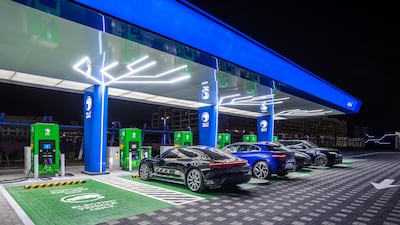Adnoc Distribution, the UAE’s largest fuel and convenience retailer, posted a 12 per cent annual increase in its first-half profit, underpinned by a surge in retail fuel volumes sold.
Net profit in the six months ended June climbed to $358 million, the Abu Dhabi National Oil Company unit said on Thursday in a filing to the Abu Dhabi Securities Exchange, where its shares trade.
The company said it recorded its largest-ever first-half fuel volumes of 7.62 billion litres, marking a 5.6 per cent year on year increase. It also recorded the highest earnings before interest, taxes, depreciation and amortisation (Ebitda) – a key measure of profitability, of $566 million, up 10 per cent year on year.
Meanwhile, revenue for the six-month period was down 2.4 per cent to $4.65 billion.
“Our strong H1 2025 results demonstrate the successful execution of our 2024-28 growth strategy, driven by operational excellence and customer-focused innovation,” said Bader Al Lamki, chief executive of Adnoc Distribution.
The company's net profit for the second quarter of 2025 was up nearly 9 per cent annually to $184 million, while revenue was down 1.6 per cent to $2.35 billion.
Adnoc Distribution expects to distribute dividend of $350 million (10.285 fils per share) for the first half of 2025, in October this year, in line with its dividend policy, it said.
Non-fuel business growth
Non-fuel retail transactions also increased with gross profit growing by 14.9 per cent year on year in the first half of 2025, driven by strong performance of convenience stores, car services, property management and lubricants businesses, the company said.
Adnoc Distribution processed more than 122 million transactions in the first half of the year, up about 6 per cent annually, the company's chief strategy, transformation and sustainability officer Athmane Benzerroug told The National on Thursday.
Fuelling those transactions was the company's non-fuel business, which has helped maintain its strong profit margins despite low oil prices amid a trend of more people travelling, he said.
Non-fuel retail transactions grew more than 10 per cent, while fuel transactions rose 4 per cent, "mainly driven by the initiatives and investments that we have done in technology through our [mobile] app", Mr Benzerroug added.
Oil price volatility
Oil prices have trended upwards since May, peaking on June 19 after Israel attacked Iran, but they have fallen since. That, among other geopolitical tension, has added to market volatility.
On Monday, oil prices dropped after Opec+ agreed to another large output rise in September.
Brent, the benchmark for two thirds of the world's oil, was up 0.55 per cent to $67.26 a barrel at 9.55am UAE time on Thursday. West Texas Intermediate, the gauge that tracks US crude, was trading 0.59 per cent higher at $64.73 a barrel.
Brent and WTI are now down about 10 per cent in 2025. On a year on year basis, the benchmarks have retreated more than 15 per cent.
New fuel stations
Adnoc Distribution said on Thursday it plans to add 60-70 new fuel stations by the end of 2025, ahead of schedule, with majority of those located in Saudi Arabia, the world's largest oil-exporting country. It added 47 new service stations in the first half of 2025, bringing its total network to nearly 940 – 556 in the UAE, 70 in Saudi Arabia (with 70 stations contracted and under development) and 243 in Egypt, Adnoc said.
The growth is complemented by company's 379 Oasis convenience stores across the UAE, Saudi Arabia and Egypt, along with 37 vehicle inspection centres. Other services span car wash and lube change, with the company boasting more than 300 EV charging points installed under the E2GO brand in the UAE.
“By leveraging advanced technologies, unlocking new operational efficiencies, and bringing our commitment to quality to more communities than ever before, we are well-positioned to deliver sustainable, long-term growth and superior returns for our shareholders,” said Mr Al Lamki.
Adnoc Distribution has pledged to expand further, supported by continued growth in the UAE's economy, in addition to incorporating the latest technologies to boost its operational and cost efficiencies.
A growing economy typically leads to increased demand for transportation services, resulting in the establishment of more fuel stations to meet growing consumption. The Emirates' economy grew by 4 per cent last year, driven by a strong expansion in its non-oil sector.
Abu Dhabi's economy, in particular, expanded by 3.8 per cent annually last year to reach an all-time high value of Dh1.2 trillion, state news agency Wam had reported in May.


